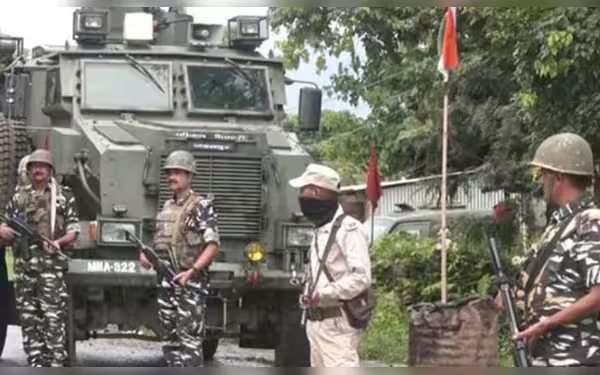Saturday, November 16, 2024 09:53 PM
Clash in Manipur: 10 Killed in Violence Between Police and Kuki Forces
- 10 killed in Manipur clash between police and Kuki forces.
- Ongoing violence linked to ethnic tensions in Manipur.
- At least 200 lives lost since conflict began in May 2023.
 Image Credits: dailytimes_pk
Image Credits: dailytimes_pkA clash in Manipur results in 10 deaths, highlighting ongoing ethnic tensions between Kuki forces and Indian police.
In the northeastern state of Manipur, India, a tragic clash occurred on Monday between the Indian police and Kuki minority forces, resulting in the deaths of at least 10 individuals. This violent encounter was triggered when the police station was attacked, leading to a fierce battle. According to Krishna Kumar, the deputy commissioner of Jiribam district, one police officer was injured during the confrontation, and authorities have since recovered the bodies of 10 individuals described as "miscreants".
The ongoing violence in Manipur is part of a larger conflict that erupted in May 2023, primarily between the predominantly Hindu Meitei community and the mainly Christian Kuki community. The recent fatalities are reported to be from the Hmar people, a smaller subgroup within the Kuki community. This escalation of violence follows the discovery of a burned corpse of a Kuki woman in the district last week, which ignited widespread anger and unrest.
Since the beginning of the conflict, at least 200 lives have been lost, and the social fabric of the region has been torn apart, with communities fracturing into rival factions. Manipur, which shares a border with the conflict-ridden Myanmar, has seen a resurgence of violence after a period of relative calm. In September alone, at least 11 people were killed, with reports indicating that insurgents have resorted to using rockets and drones to carry out attacks.
The root of the tensions between the Meitei and Kuki communities lies in competition for land and public employment opportunities. Rights activists have voiced concerns that local leaders are intensifying these ethnic divisions for their political advantage. The situation is further complicated by the fact that Manipur is governed by the Bharatiya Janata Party, led by Prime Minister Narendra Modi, which is known for its Hindu nationalist agenda.
As the conflict continues to unfold, it raises critical questions about the future of communal harmony in Manipur. The loss of life and the deepening divisions among communities serve as a stark reminder of the fragility of peace in regions marked by ethnic strife. It is essential for all stakeholders, including government officials and community leaders, to engage in dialogue and seek peaceful resolutions to prevent further bloodshed and restore stability in this troubled state.













